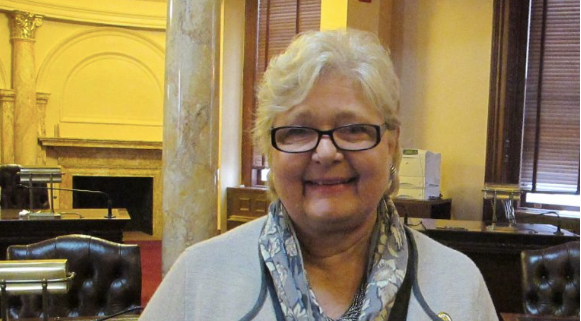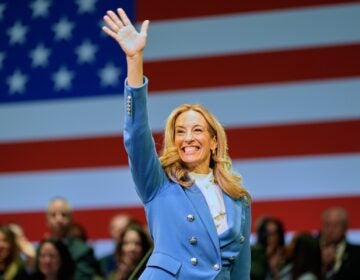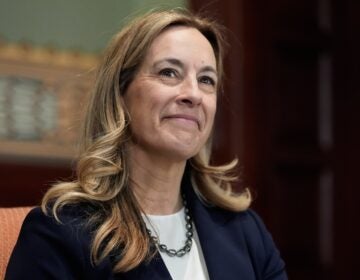Former N.J. state Senator Diane Allen starts PAC to help women get into politics
Just months after stepping aside after serving two decades as a state lawmaker, former Sen. Diane Allen is launching a political fundraising effort whose primary goal is to he

N.J. Sen. Diane Allen (Phil Gregory/WHYY)
Just months after stepping aside after serving two decades as a state lawmaker, former state Sen. Diane Allen is launching a political fundraising effort whose primary goal is to help other women, regardless of party, become members of the Legislature.
Allen has created a nonpartisan political action committee called runWOMENserve, and she said its mission is to help boost the state’s roster of female legislators by providing their campaigns with much-needed financial support when they first choose to run.
Right now, about 30 percent of the seats in the Senate and Assembly are held by women, even though the latest U.S. Census figures indicate women make up more than 50 percent of New Jersey’s overall population. The fund’s goal is to close that gap, Allen said during a news conference in the State House last week.
“It’s really important that we up our numbers. We can’t be a true democracy with such lopsided representation,” she said.
A woman’s place is in politics
Allen’s effort comes as more and more women have been getting involved in politicsin recent years, participating in large-scale demonstrations to speak out against sexual harassment and the policies of President Donald Trump, among other issues. Allen said women have gained some momentum by boosting their representation in elected office, but she added it is “far short of what it needs to be.”
“Our legislative bodies must reflect the people we represent. It’s that simple,” she said.
In addition to Allen’s departure from the Senate earlier this year, the Legislature has been experiencing a high rate of turnover in recent months. That’s due in part to Gov. Phil Murphy’s selection of a number of female lawmakers for high-profile executive-branch positions as part of an effort to establish a majority-female cabinet. Murphy also chose former Assembly Speaker Sheila Oliver (D-Essex) as his running mate last year; she’s now serving as both lieutenant governor and commissioner of the Department of Community Affairs.
Nationally, women hold nearly 25 percent of the nation’s 7,383 state legislative seats, according to the National Foundation for Women Legislators, a group that Allen once led. In New Jersey things are slightly better; there are currently 26 women among the 80 members of the Assembly, and 10 women serving in the 40-member Senate.
Equal-pay heritage
Allen, a former journalist and anchorwoman, was among the Legislature’s most-respected members during her 22-year career representing the 7th District. She is also the namesake of the state’s equal-pay law, enacted by Murphy earlier this year.
During last week’s news conference, Allen said women generally bring a “different perspective” to the role of lawmaker.
“We have different life experiences, and studies show we’re better at multitasking than men, generally,” Allen said. “In fact, we work more closely with colleagues of both genders and both parties, generally, to get things done.”
She also highlighted the role that women lawmakers played in Congress several years ago as they were largely credited with helping resolve a bitter government shutdown that gridlocked Washington, D.C., for more than two weeks.
“There was a lot of talking, and a lot of men on camera saying what they thought, on both sides — everybody was in their corners,” Allen said.
“A couple of women, Republicans and Democrats, got together in a backroom in the U.S. Senate, hammered out something that would work, presented it to the men, and it got done,” she added.
Nonpartisan funding for women
Allen’s new PAC has already been registered with the New Jersey Election Law Enforcement Commission, and she said the goal of the fund-raising effort is to provide strong financial support to the campaigns of women, regardless of political party, who decide to seek legislative seats in New Jersey, where running for office can mean running up a huge tab due to the pricey New York and Philadelphia media markets.
“Money is hard to raise when you’re first running,” Allen said. “We all know that incumbents find it much easier to fill their war chests, and we hope this may help with the disparity.”
But by registering as a “continuing political committee” under New Jersey’s campaign-finance rules, the fund will have to abide by the state’s strict fundraising and contribution limits even as the New Jersey political landscape in recent years has seen a proliferation of so-called independent-expenditure groups that use IRS loopholes to get around state contribution limits and avoid disclosing donors. Still, Allen said runWOMENserve has already received about $50,000 in contributions from both Democratic and Republican donors. And her introductory news conference drew several top lawmakers from both political parties, including Senate President Steve Sweeney (D-Gloucester) and Senate Minority Leader Tom Kean Jr. (R-Union).
“We don’t care what a woman’s political affiliation is, or her stand on particular issues,” said Allen, who served in the Legislature as a Republican.
“What we do care about is whether she will put people ahead of politics and base her decisions on what is best for New Jersey, not necessarily what is best for her party,” she said. We want her to take her cues from those she represents and not those who are in smoke-filled backrooms — I’ve never been invited to them, so I’m not sure what they’re like.”
________________________________
NJ Spotlight, an independent online news service on issues critical to New Jersey, makes its in-depth reporting available to WHYY.
WHYY is your source for fact-based, in-depth journalism and information. As a nonprofit organization, we rely on financial support from readers like you. Please give today.




